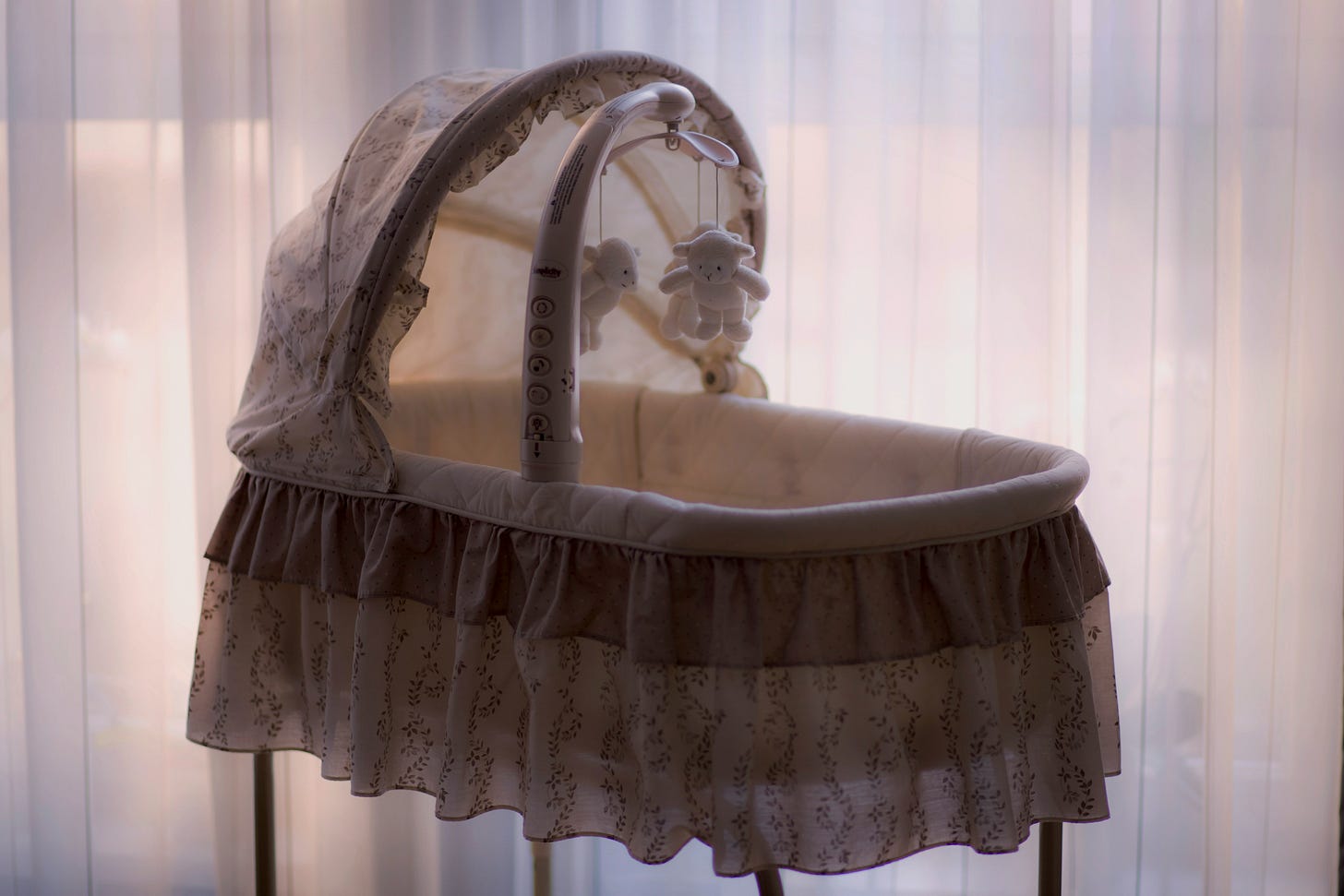What Most OBs Get Wrong About Loss—And How Dr. Jessica Vernon Is Changing the Script
The OB-GYN, mom and mental health leader at Oula shares why grief shouldn’t be an afterthought, how integrated care can transform recovery, and what providers still get wrong about pregnancy loss.
What if mental health wasn’t an afterthought in miscarriage care?
That’s the question Dr. Jessica Vernon has been answering with her work—and her words—for years. As an OB-GYN, mom of two, Associate Medical Director at Oula, and Director of Mental Health for the same practice, she’s spent her career treating patients who are grieving, navigating complex pregnancies, or trying again after loss. But what sets her apart is this: she doesn’t separate physical care from emotional care. She knows they’re deeply intertwined—and when one is ignored, both suffer.
In today’s Miscarriage Dialogues feature, we talk to Dr. Vernon about what truly supportive care looks like in the wake of miscarriage, stillbirth, or termination for medical reasons. We cover it all: the broken systems, the missteps, the subtle (and not-so-subtle) ways grief gets overlooked by providers. But also: what real change could look like. What it means to center mental health from the very first visit. And how her team at Oula is rewriting the rules of prenatal and postpartum care—especially for patients who are walking into the exam room already carrying loss.
This conversation pulls back the curtain on what providers often miss—and what grieving patients desperately need. Dr. Vernon gets brutally honest about what medical training doesn’t teach doctors: how to hold space, validate pain, and actually listen. And she shares what she’s learned from experience, from watching the best perinatal psychiatrists in action to learning how to say the right thing when there isn’t a right thing to say.
If you’ve ever felt like your loss was minimized, if you’ve left a follow-up appointment in tears because no one asked how you were doing, or if you’ve wondered whether things could be different—this one’s for you.
Because here’s the truth: the grief is real. The silence around it is systemic. But people like Dr. Vernon? They’re changing the conversation. And this dialogue is one more way we make sure it doesn’t get erased.
Scroll on for the full Q&A—and if it resonates, forward it to a provider who needs to read it.
You’ve said that in most traditional OB care, mental health is either sidelined or only addressed once there’s a full-blown crisis. Why is that such a dangerous model, especially for people who’ve experienced loss?
Physical and mental health are deeply interdependent, and we’re only just beginning to understand and acknowledge more about the mind-body connection. So, from a clinical perspective, to provide holistic care, obstetric providers must support both mental and physical health.
"People with untreated severe anxiety and depression in pregnancy are at higher risk of complications such as high blood pressure and preeclampsia, preterm labor, small birth weight, and NICU stays."
Ignoring mental health can lead to poorer outcomes for both the birthing person and baby. When people “white knuckle it” or struggle in silence without getting the mental health care they need, they may be able to get through the days—but their home life and work life can suffer. They may become depleted and feel like they’re just surviving, rather than thriving.
Pregnant and postpartum people are already at an extremely vulnerable time in their lives. As obstetricians, we need to pay attention to their mental health and emotional wellbeing to ensure they’re surrounded with the right care and support.
How does integrated mental health support — like the model Oula uses — change the patient experience from the start? Can you give us an example of what that looks like in practice?
The biggest difference when you integrate on-site mental health support is that it destigmatizes it. We talk about mental health with our patients at Oula, we acknowledge how common mental health disorders are during pregnancy and postpartum, and we counsel patients on the importance of mental and emotional health—even sharing evidence-based information about medication during pregnancy and breastfeeding. We also offer a safe space to discuss emotional well-being with providers they already know and trust.
Many traditional OB practices don’t bring up mental health because they’re not comfortable or confident addressing concerns—or they feel helpless. When they diagnose someone, they often don’t have anyone to refer to who takes the patient’s insurance or is equipped to treat pregnant and postpartum people, which requires a different expertise than general mental health care.
At Oula, we still refer out for more complex mental health concerns, such as suicidal ideation, bipolar disorder, treatment-resistant depression, and PTSD. However, we have trusted partners we know personally who will care for our patients with the right skills and compassion.
An example of how this plays out in pregnancy loss: We have a special early pregnancy care pathway for patients who experience miscarriage or a threatened miscarriage, part of which includes offering mental health support. I often see these patients after their loss to help validate their grief, emphasize that there is nothing they did to cause the loss, and support them in navigating next steps before trying again.
This may include some preconception workup, depending on their history, to help decrease the risk of recurrent miscarriage—and also helps them get established with a qualified perinatal therapist.
I also counsel them that pregnancy after loss carries a higher risk of prenatal mental health disorders, and I make sure they have the right support—mentally and physically—moving forward. If they’re extremely anxious going into a subsequent pregnancy (which is very common after loss), I ensure they receive earlier and more frequent visits with an OB provider to offer additional touchpoints during that intense time. I may also recommend and start medication if they’re struggling with anxiety, panic, or insomnia that’s affecting their daily functioning.
What do you wish more OBs and providers understood about the emotional aftermath of miscarriage or stillbirth? Where is the system still failing?
Grief is not proportionate to how far along you were in pregnancy when you experienced a loss. Many people who experience early loss often feel unjustified in their grief—maybe they never even heard a heartbeat—but every loss is a loss of a dream.
You have to mourn that in your own way. And there is no one right way to grieve.
You and your partner may grieve very differently. When you talk to loved ones, they may say the wrong thing—something unintentionally hurtful—or they may not acknowledge your loss at all because they’re uncomfortable or don’t know what to say.
This kind of disenfranchised grief—a loss that doesn’t fit societal norms or timelines—often goes unspoken, which makes it even more isolating. That’s why I always recommend finding a therapist (individual or couples) who specializes in pregnancy loss and who can support you through future pregnancies, if that’s part of your journey.
OB providers often do not address the mental and emotional aspect of loss. They often say the wrong things or use language that is hurtful, dismissive, or traumatizing. If you need a medical procedure after a loss, or have to birth your baby after a loss, this can all be very traumatizing as well.
There are doulas who specialize in pregnancy loss and can support you through that experience. Support groups can be incredibly helpful, too. Postpartum Support International (I’m on their board) offers free weekly support groups and can connect people with qualified providers in their area.
That said, there simply aren’t enough mental health professionals specializing in perinatal loss, and many are out-of-network. I know how difficult it can be to access the support you need. But community matters. It validates. It reminds you that you’re not alone. Online communities and organizations focused on pregnancy loss can offer incredible comfort.
And I want to specifically name termination for medical reasons (TFMR)—this type of loss carries another layer of pain. Parents who terminate because of a severe anomaly often feel so much guilt and shame, they can’t even talk about their loss. I want them to know: we see you. You are not alone. And it is not your fault.
Grieve your baby. Find support in community. Share your story when you’re ready. You don’t have to carry it in silence.
Another often-overlooked experience is ectopic pregnancy. This is a loss, too—and it’s often misunderstood. Sometimes the baby is developing normally but in the wrong place, like the fallopian tube, where the pregnancy can’t continue. We don’t currently have a way to move it to the uterus. So when someone hears their pregnancy is ectopic and has to end it, that’s an incredibly hard truth to live with—and even harder to explain to others.
The system is failing at so many levels. One of the most egregious? The lack of time and space to grieve.
If you have a pregnancy loss, you often don’t qualify for any personal or maternity leave. I regularly take patients out of work on mental health leave to give them time to recover—mentally and physically—after losing a baby. It’s already an incredibly painful experience, but when the system acts as if nothing happened and expects you to return to normal life, it adds another layer of trauma.
I hope that as more people speak out and share their experiences, we’ll see real awareness, advocacy, and policy change.
Many of our readers have shared that after their losses, their emotional pain was minimized — or worse, ignored. What are some signs of distress or grief that providers often overlook or misinterpret?
Disenfranchised grief is a huge part of this—and it’s often invisible to those who aren’t paying attention. I think many people don’t open up about their emotional pain after loss because they don’t feel like anyone truly wants to hear it. But if those around them—especially providers—genuinely acknowledged the pain and asked how they were feeling, it could create space for them to share.
I talk to patients all the time and say something as simple as, “That is so terrible. I’m so sorry for your loss and everything you’ve had to go through. How are you feeling? How can I support you?” And the floodgates open. They feel permission to be sad, to grieve, to fully experience what they’ve been holding inside. From there, we can connect them to the right resources and support and begin the healing process.
If grief becomes complicated by depression, they’ll need additional support. If someone is really isolating, not returning to normal activities over time, consistently tearful or numb, or seems emotionally avoidant, those are red flags. Try to connect with them and encourage them to seek mental health care.
Grief takes time—and it looks different for everyone. But when grief starts to worsen instead of slowly improving, or when it starts affecting someone’s ability to function, that may signal clinical depression.
In your experience, how do people typically show up for appointments after loss? Are there emotional red flags you’ve learned to look for that weren’t part of your training?
Everyone presents differently. Some switch providers entirely. Some avoid care for months. Some show up guarded, angry, or emotionally detached.
If I’ve built a safe relationship with a patient, they’re more likely to open up. But nothing in my training taught me how to hold space, how to deliver devastating news, or how to follow up in a way that’s truly compassionate. I had to learn that on my own—mostly through my patients.
Some people still stay guarded or angry, and I’ve learned not to take that personally. Everyone copes in their own way. My job is to stay steady, present, and available.
How has your approach to patient care evolved after working so closely with grieving or high-risk patients?
In every way. The biggest shift came from watching and listening to exceptional perinatal psychiatrists and doing additional training in perinatal mental health.
I’ve learned how to really sit with someone in their pain, how to hold space, how to validate instead of fix. I never want anyone to feel alone in what they’re going through. So it’s deeply important to me to be a steady presence—to meet them where they are, emotionally and physically.
What does truly supportive care look like for someone who is pregnant again after loss — especially when fear and trauma are still very present?
It starts with mental health support and more frequent touchpoints with the OB team. These patients want to know that their baby’s heartbeat is strong, that their labs look good—they need reassurance to get through the pregnancy.
I bring patients in more often—even when we can’t bill for those visits—because their mental well-being matters just as much as their physical health. Some providers might dismiss that, saying it’s “not part of routine care.” But everyone is different. If I were in their shoes, I’d want those extra check-ins, too. So I offer them.
What tools or systems (whether clinical or emotional) should be in place to make that journey feel safer?
Integrated care models that embed mental health into OB care are essential. That means having therapists as part of the team—not as an afterthought or outside referral. And support groups can be incredibly helpful, too.
Patients need to hear from others who’ve been there—who can validate their fear, their grief, their anxiety. They also benefit from hearing from those who’ve made it through and can share what helped along the way. That sense of community, that sense of “you’re not alone,” is often just as healing as the clinical care.
If you could rewrite the typical maternity care plan with mental health at the center — from the first prenatal visit to postpartum — what would that look like?
It would look a lot more like the midwifery model. Start with understanding the whole person—not just their medical history, but their social context, support systems, work environment, cultural background.
From the first visit, screen for perinatal mental health risk factors. People are often surprised by how common they are—and how early signs can show up. Then build in mental health consults, therapy options, and regular emotional check-ins.
For higher-risk patients, don’t wait six weeks postpartum. Check in at one or two weeks. And remind every patient: “You’re postpartum for the whole first year.” Hormone shifts, identity transitions, and cumulative stress can all hit later than expected.
For providers who want to do better but feel unequipped to handle grief, trauma, or complex emotional needs: where should they start?
Postpartum Support International is one of the best resources out there—for both providers and patients. It offers clinical training, directories, and free weekly support groups. I always recommend providers get to know local therapists who specialize in perinatal mental health, too.
And a crucial reminder: don’t open up someone’s trauma unless you’re trained to help them process it. Some patients want to debrief what happened during a traumatic birth or loss. I’ll walk through the facts with them—but I’m clear that deeper trauma work needs to be done with a specialist.
I’m not a trauma therapist. I shouldn’t reopen wounds I’m not trained to help them heal.
That said, for most providers, simply asking “How are you really doing?” and acknowledging that emotional health is essential—not just for the individual, but for their whole family—can be the first step. That question alone can change everything.
These conversations matter, and so does your voice.
If you have a story to share, an idea to pitch or just want to reach out, we’d love to hear from you. Email us at jenn@milaandjomedia.com or send us a DM at @miscarriagemovement.
Talking about miscarriage shouldn’t feel like a secret. Let’s keep pushing for change—together.









